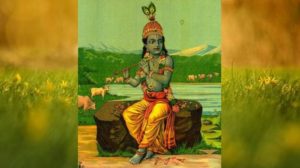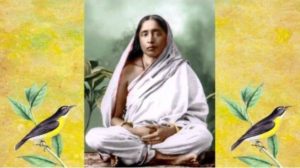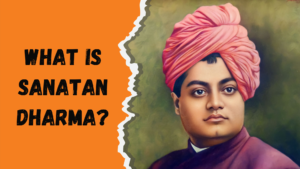Arjuna Wins Draupadi’s Hand
Among the Brahmanas were seated the five Pandava brothers. Arjuna, the third brother, was the hero of the bow. He arose and stepped forward. Now, Brahmanas as a caste are very quiet and rather timid people. According to the law, they must not touch a warlike weapon, they must not wield a sword, they must not go into any enterprise that is dangerous. Their life is one of contemplation, study, and control of the inner nature.
Judge, therefore, how quiet and peaceable a people they are. When the Brahmanas saw this man get up, they thought this man was going to bring the wrath of the Kshatriyas upon them, and that they would all be killed.
So they tried to dissuade him, but Arjuna did not listen to them, because he was a soldier. He lifted the bow in his hand, strung it without any effort, and drawing it, sent the arrow right through the wheel and hit the eye of the fish.
Then there was great jubilation. Draupadi, the princess, approached Arjuna and threw the beautiful garland of flowers over his head. But there arose a great cry among the princes, who could not bear the idea that this beautiful princess who was a Kshatriya should be won by a poor Brahmana, from among this huge assembly of kings and princes. So, they wanted to fight Arjuna and snatch her from him by force. The brothers had a tremendous fight with the warriors, but held their own, and carried off the bride in triumph.
Draupadi Marries the 5 Pandavas
The five brothers now returned home to Kunti with the princess. Brahmanas have to live by begging. So they, who lived as Brahmanas, used to go out, and what they got by begging they brought home and the mother divided it among them.
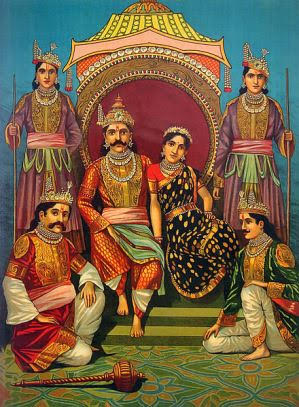
(Painting by Raja Ravi Varma)
Thus the five brothers, with the princess, came to the cottage where the mother lived. They shouted out to her jocosely, “Mother, we have brought home a most wonderful alms today.” The mother replied, “Enjoy it in common, all of you, my children.” Then the mother seeing the princess, exclaimed, “Oh! What have I said! It is a girl!”
But what could be done! The mother’s word was spoken once for all. It must not be disregarded. The mother’s words must be fulfilled. She could not be made to utter an untruth, as she never had done so. So Draupadi became the common wife of all the five brothers.
Now, you know, in every society there are stages of development. Behind this epic there is a wonderful glimpse of the ancient historic times. The author of the poem mentions the fact of the five brothers marrying the same woman, but he tries to gloss it over, to find an excuse and a cause for such an act: it was the mother’s command, the mother sanctioned this strange betrothal, and so on. You know, in every nation there has been a certain stage in society that allowed polyandry — all the brothers of a family would marry one wife in common. Now, this was evidently a glimpse of the past polyandrous stage.
In the meantime, the brother of the princess was perplexed in his mind and thought: “Who are these people? Who is this man whom my sister is going to marry? They have not any chariots, horses, or anything. Why, they go on foot!” So he had followed them at a distance, and at night overheard their conversation and became fully convinced that they were really Kshatriyas.
Then King Drupada came to know who they were and was greatly delighted. Though at first much objection was raised, it was declared by Vyasa that such a marriage was allowable for these princes, and it was permitted.
So the king Drupada had to yield to this polyandrous marriage, and the princess was married to the five sons of Pandu.
Yudhishthira Becomes the Emperor of India
Then the Pandavas lived in peace and prosperity and became more powerful every day. Though Duryodhana and his party conceived of fresh plots to destroy them, King Dhritarashtra was prevailed upon by the wise counsels of the elders to make peace with the Pandavas; and so he invited them home amidst the rejoicings of the people and gave them half of the kingdom.
Then, the five brothers built for themselves a beautiful city, called Indraprastha, and extended their dominions, laying all the people under tribute to them. Then the eldest, Yudhishthira, in order to declare himself emperor over all the kings of ancient India, decided to perform a Rajasuya Yajna or Imperial Sacrifice, in which the conquered kings would have to come with tribute and swear allegiance, and help the performance of the sacrifice by personal services.
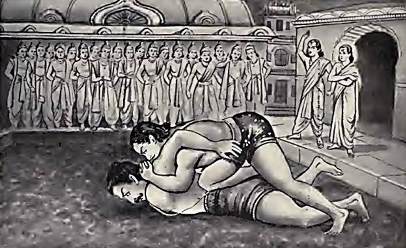
(Courtesy: Mahabharata by Gita Press)
Shri Krishna, who had become their friend and a relative, came to them and approved of the idea. But there alas was one obstacle to its performance. A king, Jarasandha by name, who intended to offer a sacrifice of a hundred kings, had eighty-six of them kept as captives with him.
Shri Krishna counselled an attack on Jarasandha. So he, Bhima, and Arjuna challenged the king, who accepted the challenge and was finally conquered by Bhima after fourteen days of continuous wrestling. The captive kings were then set free.
Then the four younger brothers went out with armies on a conquering expedition, each in a different direction, and brought all the kings under subjection to Yudhishthira. Returning, they laid all the vast wealth they secured at the feet of the eldest brother to meet the expenses of the great sacrifice.
So, to this Rajasuya sacrifice all the liberated kings came, along with those conquered by the brothers, and rendered homage to Yudhishthira. King Dhritarashtra and his sons were also invited to come and take a share in the performance of the sacrifice. At the conclusion of the sacrifice, Yudhishthira was crowned emperor, and declared as lord paramount. This was the sowing of the future feud.
Duryodhana Usurps the Pandava’s Kingdom in a Rigged Game of Dice
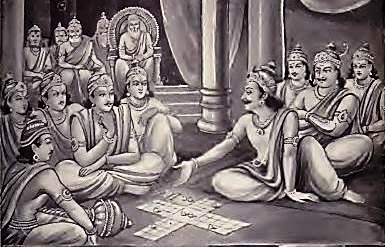
(Courtesy: Mahabharata by Gita Press)
Duryodhana came back from the sacrifice filled with jealousy against Yudhishthira, as their sovereignty and vast splendour and wealth were more than he could bear; and so he devised plans to effect their fall by guile, as he knew that to overcome them by force was beyond his power.
This king, Yudhishthira, had the love of gambling, and he was challenged at an evil hour to play dice with Shakuni, the crafty gambler and the evil genius of Duryodhana.
In ancient India, if a man of the military caste was challenged to fight, he must at any price accept the challenge to uphold his honour. And if he was challenged to play dice, it was a point of honour to play, and dishonourable to decline the challenge. King Yudhishthira, says the Epic, was the incarnation of all virtues. Even he, the great sage-king, had to accept the challenge.
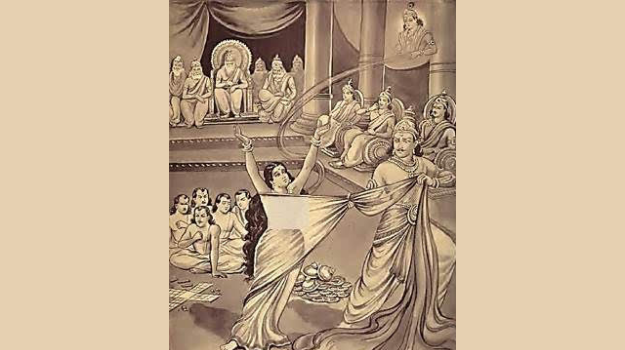
(Courtesy Mahabharata in Hindi by Gita Press)
Shakuni and his party had made false dice. So Yudhishthira lost game after game, and stung with his losses, he went on with the fatal game, staking everything he had, and losing all, until all his possessions, his kingdom and everything, were lost.
The last stage came when, under further challenge, he had no other resources left but to stake his brothers, and then himself, and last of all, the fair Draupadi, and lost all.
Now they were completely at the mercy of the Kauravas, who cast all sorts of insults upon them, and subjected Draupadi to the most inhuman treatment.
At last through the intervention of the blind king, they got their liberty, and were asked to return home and rule their kingdom.
But Duryodhana saw the danger and forced his father to allow one more throw of the dice in which the party which would lose, should retire to the forests for twelve years, and then live unrecognised in a city for one year; but if they were found out, the same term of exile should have to be undergone once again and then only the kingdom was to be restored to the exiled. This last game also Yudhishthira lost, and the five Pandava brothers retired to the forests with Draupadi, as homeless exiles.
Mahabharata Summary Continued | NEXT: Pandavas are Exiled & Story of Savitri and Satyavan >>

